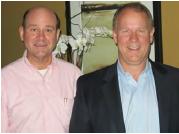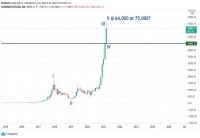|
CTA Third Street Ag Investments sees opportunity in the upcoming global shift By Chad Burlet 
Chad Burlet (R) migrated from
Goldman Sachs and Bob Otter
(L) came from the Chicago
Board of Trade grain trading
floor to form Third Street Ag Investments.
We find ourselves at an interesting juncture in world agriculture. After years of shortages and tight supplies, the market is transitioning to a more comfortable situation and we could well be looking at surpluses by the fall of 2014. The relatively high global grain prices of the past several years have performed their economic function. New land has been brought into production in South America and the FSU. Better seed genetics, better farm practices and better use of fertilizers and pesticides have increased yields everywhere. Investments in infrastructure have improved grain handling, transportation, and storage in many key countries. To understand the events that created our recent shortages we need to look back several years. In 2009 we saw a sharp increase in the growth rate of global demand. Until that point the rate of growth had been relatively constant. There were two key changes that brought this about: the rapidly expanding Asian middle class was improving its diet, and dozens of countries started to use grains and oilseeds as renewable fuels. Meanwhile, on the supply side, there was an unfortunate series of crop disasters in key growing areas. In rapid succession Russia, South America, and the U.S. all suffered major crop reductions. For the past five years the prices of wheat, soybeans and corn have been 30%, 54% and 68% higher, respectively, than they were for the previous five years. So where do we believe the market will go from here? As stated above, we are transitioning into an era of surpluses. The U.S. has just completed a very difficult growing season. Torrential spring rains caused 10 million acres to go unplanted. Following this, key growing areas of the central Midwest had record low rainfall in July and August. Despite those major problems we are increasing the U.S. soybean carryout by 20% and adding more than 1.2 billion bushels to the U.S. corn carryout. The function of the market will soon move from pricing additional land into production to pricing land out of production. We see excellent opportunities in this transition. The prices necessary to cause productive land to go fallow are painfully low, possibly lower than many would expect. As our world view is confirmed we will position ourselves for a move into a lower price paradigm. Also, the different grain and oilseed markets will not make this adjustment uniformly. We already see price dislocations between commodities that compete for the same land and compete for a similar spot in animal feed rations. Those dislocations will correct over time. Our ability to identify and capitalize on those dislocations is our core strength. Weather is the one factor that can change this script in a relatively short period of time, which is why the monitoring of weather and crop conditions is one of our highest priorities. We believe the agricultural markets will be blessed with many major opportunities in the next several years. Our fundamental discretionary strategy is non-correlated to other asset management options. This is the ideal time for investors to consider an investment in our sector. Chad Burlet & Bob Otter Background: It is at key junctures such as this where Third Street Ag Investments will have a distinct advantage. The two Principals have an average of 35 years of experience. Chief Trading Officer Chad Burlet has split his career evenly between the commercial grain trade, working for Cargill and Goldman Sachs, and asset management for himself and others. COO and Chief Risk Officer Bob Otter has spent his career at the Chicago Board of trade working as a trader and broker, developing a strong data base on agricultural markets. Their extensive experience gives them the perspective needed to put these mega-trends in context. |
|
This article was published in Opalesque Futures Intelligence.
|





 RSS
RSS









